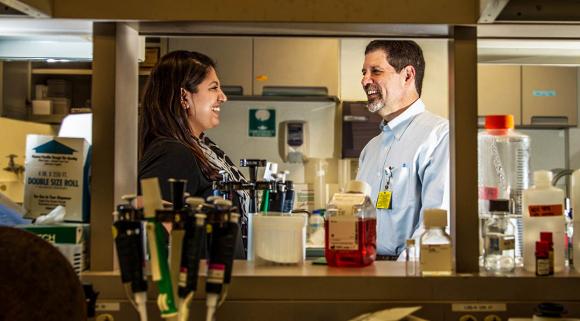PROVIDENCE, R.I. [Brown University] — With a new, nationally competitive Gilliam fellowship from the Howard Hughes Medical Institute, Valerie Zabala will be able to provide to others the gift of guidance she has received.
She praises the three mentors she’s had, starting with her undergraduate studies at Rhode Island College. The new award will support her in multiple ways, including financial support for three years of graduate studies and training to become a mentor to inspire others.
“I think I’m really fortunate that I have always been in places where people have been really encouraging,” she said. “But I know that’s not the case everywhere.”
A Rhode Island story
Her father, Eduardo Zabala of Providence, came to Rhode Island from Bolivia decades ago to work in the city’s once-thriving jewelry industry. While he may not understand the details of the science she does now, he has supported her path. He is, after all, her inspiration. Watching him melt and bend metals gave her an interest in chemistry.
Her scientific curiosity led her to work with biochemist Karen Almeida, a Brown alumna and a professor at Rhode Island College who introduced her to research. Then Zabala worked in the Rhode Island Hospital lab of Dr. Suzanne de la Monte, professor of pathology and laboratory medicine at Brown, who studies how liver metabolism and environmental exposures can ultimately affect the health of the brain.
Clearly it was a productive time. Earlier this year Zabala was the lead author on a paper with de la Monte in the journal Alcohol and Alcoholism, showing how a combination of alcohol and chemicals in cigarettes jointly attack the liver in rats.
It wasn’t until the last year of her undergraduate studies at RIC that Zabala even became aware of graduate school as an option;no one around her talked about it when she was making her initial college plans. But she wanted to continue to pursue science, so she applied to Brown.
“There is tremendous support for doctoral students here at Brown,” she said.
Now Zabala is in the beginning of her doctoral research — just last week she passed the exam that marks the transition into becoming a doctoral candidate. She is studying in the Rhode Island Hospital-based lab of Dr. Phil Gruppuso, professor of pediatrics and molecular biology, cell biology and biochemistry. She’s still studying the liver, but in a different way. Her dissertation will examine how surges in oxygen to the liver — for instance among premature babies or among transplant recipients — can be harmful, with the goal of preventing that harm from occurring.
In addition to earning the HHMI fellowship, Zabala received an NSF fellowship that will support her work afterward.
“She is wonderfully dedicated to and interested in science,” Gruppuso said. “ And, needless to say, she is very bright.”
A new opportunity
Zabala’s work with her HHMI fellowship will begin at the first meeting in late September in Washington, D.C. She and other winners will present their work and mix and mingle other scientists from different disciplines. She said the experience promises to give her fresh ideas about doing science that she may be able to apply to in her own work.
She’ll also begin the mentoring training. The Gilliam Fellowship provides support and training to students who are committed to promoting diversity and inclusion in biomedical research at their university and in their careers.
“There are going to be breakout sessions where we talk about inclusion in the sciences and what that means to us and [how we can] prepare to become mentors in the future,” she said. “Being a mentor is so important in promoting diversity and inclusion in the sciences [for] people who wouldn’t normally go into the sciences. Having mentors available is what changes the face of what we do.”
Zabala said she looks forward to that.
“I have had fantastic mentors. I’ve been very, very lucky between Karen, Suzanne, and now Phil,” she said. “They provide a lot of professional development advice, and not only were they supportive of me but they also gave me such great criticism. They were able to help me become a better scientist and a better student. I would love to do that for other people.”
Gruppuso said she’ll get the chance, as a new and less experienced researcher has just joined the lab.
“She is a very generous and warm person,” Gruppuso said. “She’ll be a great mentor.”

